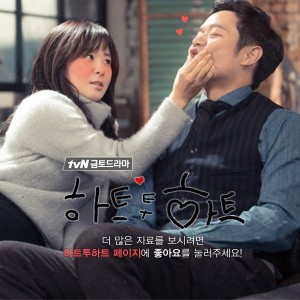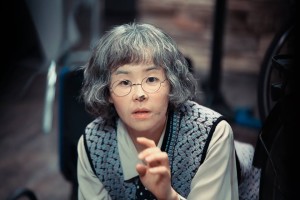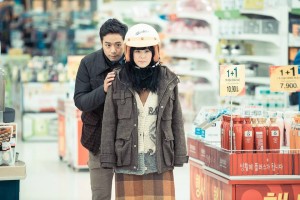 My friend Shakespeare — who will visit often throughout my analysis of Heart to Heart) — once said, “who could refrain that had a heart to love, and in that heart courage to make love known?”
My friend Shakespeare — who will visit often throughout my analysis of Heart to Heart) — once said, “who could refrain that had a heart to love, and in that heart courage to make love known?”
Cha Hong-do’s initial flushed, blushed, and shushed personality made it possible to imagine her love story as a cliché prelude into a K-drama about a “sick” female protagonist who feebly locks herself up in a little cubbyhole of an apartment with her homegrown vegetables and coral printed laundry to keep her company, but who then somehow miraculously falls in love with an egomaniac chaebol with a dark past.
I’d expect the sequence to resume with her extremely slow collecting of bravery and resolution to confess and love. But lo’ and behold, Hong-do is a heroine beyond the bottle, with an unfaltering personality to boot. In the words of the bard mentioned afore, Hong-do has a merciful and mighty heart, and the courage to make the love bubbling inside that heart known to the one whom it belongs to (and even to opponents).
 In these episodes, Hong-do begins to realize the strength of her growing love for Yi-seok, and contends with herself about how, where, and if she should express it. Yi-seok has gradually morphed into a slightly more attentive, albeit still conniving, character. His journey into true love – beyond esteem, appearance, and wealth — is being redrawn by Hong-do’s compassion and the effort she expends on recovering and re-socializing.
In these episodes, Hong-do begins to realize the strength of her growing love for Yi-seok, and contends with herself about how, where, and if she should express it. Yi-seok has gradually morphed into a slightly more attentive, albeit still conniving, character. His journey into true love – beyond esteem, appearance, and wealth — is being redrawn by Hong-do’s compassion and the effort she expends on recovering and re-socializing.
The climax steals from the shadows and into the glowing streetlights when Hong-do confronts Yi-seok and confesses her frustration and says that she is going “crazy” with worry for him after learning about his tragic past from his psychiatrist. With her woolen scarf wrapped around her head for protection, she captures and receives a confirmation from his heart. From this point onward, Hong-do and Yi-seok have acceded to one another and stand firm in their pursuit of loving together.
 Meanwhile Se-ro has rapidly scaled up the gamut of expectation and growth, and has written herself down as a “good guy” in my journal. She tirelessly trails after a forlorn Do-soo, who is crushed after realizing that Hong-do is in love with Yi-seok and that he can no longer associate with her on an intimate level. Seeing Do-soo shed tears and tell Hong-do not to leave him is absolutely heartbreaking because of the irony in his persona; our very hopes are surpassed with the degree of selfish affection in a character like Do-soo; he’s caring but covetous, lively but lonely, and determined but desperate. His development as a character is highly internal.
Meanwhile Se-ro has rapidly scaled up the gamut of expectation and growth, and has written herself down as a “good guy” in my journal. She tirelessly trails after a forlorn Do-soo, who is crushed after realizing that Hong-do is in love with Yi-seok and that he can no longer associate with her on an intimate level. Seeing Do-soo shed tears and tell Hong-do not to leave him is absolutely heartbreaking because of the irony in his persona; our very hopes are surpassed with the degree of selfish affection in a character like Do-soo; he’s caring but covetous, lively but lonely, and determined but desperate. His development as a character is highly internal.
Se-ro does her best to comfort Do-soo and constantly assures him of how much she likes him. Do-soo, still suffering from lovesickness, gently refuses her advances but can’t help but warm up to her and her scented candles, sunlit flowers, and bubble wrap fortifications.
 While Hong-do and Yi-seok are fending off rivals, resolving misunderstandings, and adorably discovering the depths of their love, Yi-seok’s grandfather has joined into the love conflict as a third competitor.
While Hong-do and Yi-seok are fending off rivals, resolving misunderstandings, and adorably discovering the depths of their love, Yi-seok’s grandfather has joined into the love conflict as a third competitor.
Honestly speaking, the Chairman’s conundrum makes me feel miserable for him, just thinking about what could happen to his aged heart once he is faced with the truth is an ambiguous picture; one thing that is for certain is that his character has advanced in depth and is yet another important player in Hong-do’s past. I believe that he ultimately holds the greatest explanation as to what happened and who is really to blame. Will the Chairman ever warm up to the young lovers, or will he morph into a conniving and even crabbier old man?
This event leads to a turning point in not only Hong-do’s love life, but in her life as a human being overcoming her foibles and accepting herself for who she is. Hong-do accosts this final stage upon which she vows to love without fear or reluctance. After all, the only way love lasts a lifetime is if it is unconditional. The most admirable thing about the irony in Hong-do’s persona is the fact that she is a valiant, steadfast, and self-sacrificing heroine whom I believe has the capacity to soften the stone-hearted and melt the soft-hearted.
 The very last surprise in this ornate box of episodes is the splintered relationship between Hong-do, Yi-seok, Yi-seok’s mother, and Yi-seok’s grandfather. After inquiring into Hong-do’s past, the Chairman makes a discovery that sabotages the rehabilitation of Yi-seok’s mother, endangers Yi-seok’s relationship with Hong-do, and places Hong-do in a very cruel circumstance. “Ah, my fate” indeed!
The very last surprise in this ornate box of episodes is the splintered relationship between Hong-do, Yi-seok, Yi-seok’s mother, and Yi-seok’s grandfather. After inquiring into Hong-do’s past, the Chairman makes a discovery that sabotages the rehabilitation of Yi-seok’s mother, endangers Yi-seok’s relationship with Hong-do, and places Hong-do in a very cruel circumstance. “Ah, my fate” indeed!
The opening of episode 12 foreshadows the next calamity she must travail. Allegedly, Hong-do is a murderer. The only way in which Hong-do can escape the scorn and malice of Yi-seok’s mother and the neglect of Yi-seok himself is if there is a broader channel to the tragedy years ago. Either Hong-do was coerced into lighting the match, lit the match out of a fear of something greater, or was blamed for killing Yi-seok’s brother in someone else’s stead. In the end, there is no childish mistake that takes the life of another child and destroys the relationship between a family; I say there is more drama and intrigue to come, and that Hong-do’s gentle grandmother may have a critical role in the sweeping vignette.
Heart to Heart is excelling as a multi-layered drama with a love story at its core. Layers such as past tragedy, mental illness, childhood friendship, and the bonds of family are piled atop of Hong-do and Yi-seok’s love story, but serve excellently in directing the focus towards the only source of hope – a union between two faithful hearts.
Readers, do you think there is hope for Hong-do and Yi-seok?
(Images via tvN)


